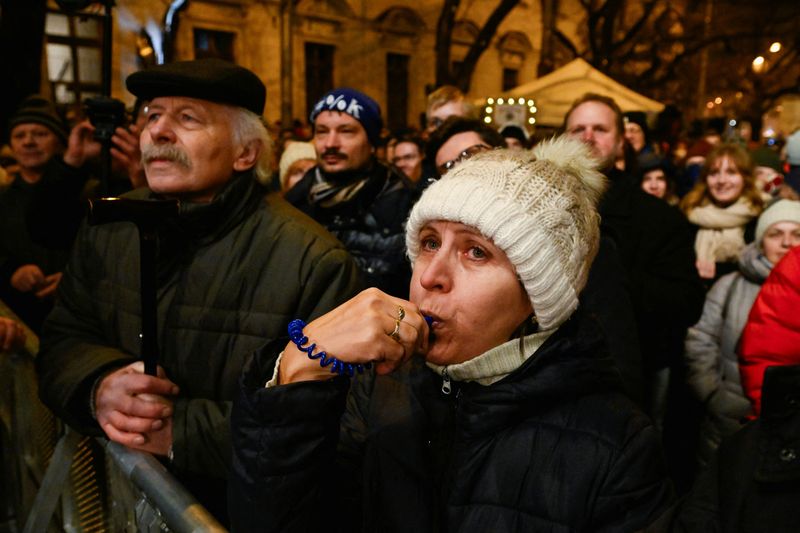Thousands of Slovaks continue protesting government’s criminal law reforms
2023.12.19 15:36

© Reuters. Demonstrators take part in a protest against the government’s plan to scrap a special prosecutor’s office, in Bratislava, Slovakia, December 19, 2023. REUTERS/Radovan Stoklasa
By Radovan Stoklasa
BRATISLAVA (Reuters) – At least 15,000 people demonstrated in Slovakia’s capital on Tuesday as protests grew against plans of Prime Minister Robert Fico’s government to fast-track criminal law changes that include scrapping a special prosecutor’s office focused on corruption.
Opposition parties led protests in cities around the central European country of 5.4 million for a third straight week, with protesters in Bratislava waving Slovak and European Union flags and chanting “Enough of Fico”.
Dennik N news website said 15,000 to 18,000 protested, up from 10,000 a week ago.
The new government, in power since October, is seeking to speed through proposals in parliament that include scrapping a special prosecutor’s office for high-profile graft cases, limiting protection of whistleblowers and reducing sentences for financial crimes.
The European Commission has warned it will take action against Slovakia if it violates EU laws.
Opposition parties have promised to do all they can to block the reform plans.
“(The government is) underestimating us,” Michal Simecka, head of the biggest opposition party in parliament, Progressive Slovakia, told the crowd.
“We have to show them they are wrong. We have to show them that we are defending justice and democracy, even in the winter, even before Christmas.”
Patrik Kamencay, 25, said he joined the protest because he does not like how Slovakia looked in the EU.
“The government comes with big promises about… how it will improve the lives of citizens,” he said. “And the first thing it does is try to distort the criminal procedure and abolish the special prosecutor’s office.”
Fico, a four-time premier who resigned in 2018 amid mass protests against corruption that followed the murder of an investigative journalist, has accused the special prosecutor’s office of being politically motivated and has said its actions violated human rights.
The government had sought to enact the legislation by Christmas but government officials have said a vote could shift to January.
The government has set out several changes in its first few months in office that have irked the opposition, activists and others.
A group of press freedom organisations said this month plans to cut funding to state broadcaster RTVS and divide the group into radio and television units would undermine its independence and threaten media freedom.
On Monday, the heads of the anti-monopoly and healthcare regulatory watchdogs appealed in an open letter to the government and lawmakers against planned legislative changes affecting the selection of future chairs to their offices that would make “them dependent on the political will of the government”.








